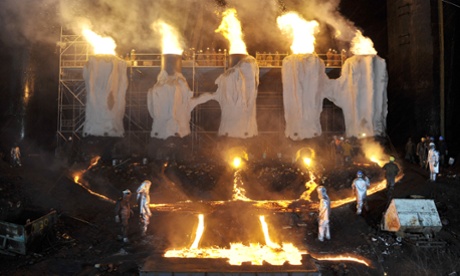
Last month, artist Matthew Barney and composer Jonathan Bepler’s operatic 311-minute film River of Fundament made its debut in New York. The premiere was attended by stars including Maggie Gyllenhaal (who’s in it) and Kanye West (who isn’t). On Saturday, the film came to Adelaide festival, the first staging post on a tour of concert halls and cinemas in which it will be shown around the world. River of Fundament is not being distributed like a film in the conventional sense – it’s touring the globe one place at a time, largely concert halls. There’s a conversation between Barney and Gasper Noe about it here.
River of Fundament is a meditation on death and rebirth, which starts with a wake in Norman Mailer’s home, where the author’s spirit is being reincarnated in the sewers beneath. The film is an extremely loose adaptation of Mailer’s novel Ancient Evenings, the pugnacious writer’s take on ancient Egypt. It’s a book William Burroughs admired, though few other readers did – it is famously impenetrable, and even more notoriously scatalogical, with the hero having to swim through three rivers of shit before he can be reborn. “The way the novel transposes the body and the landscape is one thing that attracted me to it,” Barney told 032c. “Bodily functions are interchangeable with the primordial ooze of the earth.”
It’s those bodily functions that have caused the controversy. The Hollywood Reporter’s review detailed with some relish scenes that include people defecating, a close-up of an anus being licked and a snogging session between two pregnant women that culminates in one removing her glass eye and sticking it up the other one’s bottom. (The recipient is a woman called Bobbi Starr, who according to Barney is “a classical oboist. And one of the most famous anal actresses in the adult film business.” So now you know.)
However, others who have seen the film say that these are brief moments in a massively long work, and not indicative of its tone as a whole. Despite the extremity of the concept (and content), Barney has certainly amassed a starry cast, who are perhaps aiming for art-world immortality alongside their literary, viral or Hollywood fame. As well as Gyllenhaal there’s Elaine Stritch, Salman Rushdie, Debbie Harry, YouTube beatboxer Ryan Robinson and Paul Giamatti, of whose appearance the wisecracking Hollywood Reporter says:
The Oscar-nominated actor appears in the first act of the film as Ptah-nem-hotep, the current Pharaoh of ... Egypt? New York? The world? Hard to say, but his character has affection for the soul of Mailer. Giamatti is clearly a king – throughout his time in the film he’s being given head rubs, foot massages and hand jobs, but he’s still envious of the resurrected author’s access to the gods. Giamatti has a great scene where he talks about the essence of fecal matter and magic. Not exactly the wine-infused philosophy of Sideways, but close.
The film also includes footage from actual live events staged by Barney, involving cars being demolished and reconfigured in epically ritualistic style, relevant to the demise of the car industry in Australia, although no Aussie critics appeared to draw that comparison. But is it any good? In his review for the Guardian, Alfred Hickling drew an unlikely parallel, saying:
The film stands as a brilliantly rendered, giddily self-referential satire of contemporary American culture; though much the same could be said about the Lego Movie, with which River of Fundament shares more in common than it may care to admit.
The Australian critics have been much less enthusiastic, with the Age’s Debbie Cuthbertson pressing the outrage button. “What Barney’s film illustrates so graphically is that something really is rotten in the United States of America. Rotten to the core,” she fumes. “Much of River of Fundament is laughable in its self-importance, although it’s not clear if amusement was the reaction Barney was expecting to generate.”
The ABC’s Alison Croggan had a more thoughtful take. While she clearly hated the film, she admired the live set-pieces, but concluded that the film was ultimately all about the glorification of the male artistic ego.
I guess you could read the film in retrospect as a satire on the futility of this very masculine project, the monstrousness and destructiveness of the white male ego (although, as with all this genealogy of art, you are meant to admire its majestic abjection). But in the watching there is no perspective: a satirical reading requires its various aspects to have their own autonomies, existences that reach beyond the claustrophobic neurotic ego that drives the narrative.
Kira Nam Greene had a similar reaction, concluding her review by saying that:
The experience of watching Barney’s movie was not unlike watching hyper violent blockbuster movies, where the machismo of the bloody spectacle co-mingles with highly sentimental nostalgia for lost causes or past glory. In the case of River of Fundament, after nearly six hours, you are left with the very empty and reductive idea how the destructive power of masculinity is the mythic source of all creativity, and how this power is debased in the modern world.
In fact, the more you read about River of Fundament, the more it seems that admiration or hatred for it is divided along gender lines. This would no doubt have pleased Norman Mailer, who was no feminist and whose 1971 debate with four women including Germaine Greer was immortalised in a film by DA Pennebaker. Never mind the shitting – perhaps it’s invoking Mailer’s spirit in 2014 that is truly provocative. Speaking personally, I can’t wait to see it.

